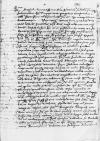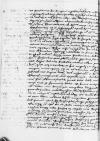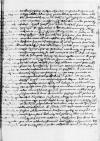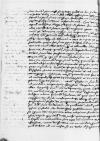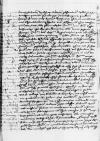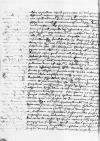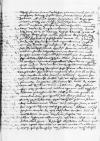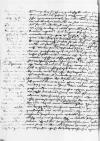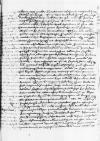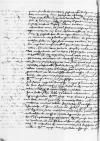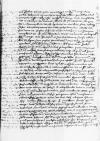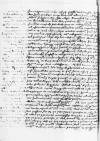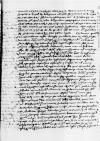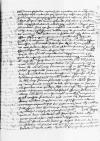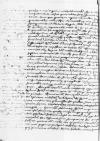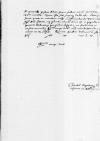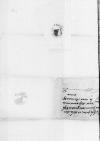Vix umquam verus sum, quoties unis datis litteris, pauculos post dies mox alteras me missurum recipio. Feci hoc et in posterioribus meis 21. Februarii, sed quominus receptum hucusque persoluerim, fuit quod nihildum rerum, de quibus tum scripsi, expeditum sit, et reverendissimi domini ⌊episcopi Plocensis⌋ negotia me occupatum tenuerint, quae meae curae commissa sunt post ⌊Thomae Conopniczki⌋ discessum, et nondum quidem expedita (non enim tam celeriter potuerunt) sed quae tamen brevi expedientur, meque procul dubio in magna gratia apud ipsum ponent. Ea sunt indultum conferendi sacerdotia totius dioecesis Plocensis, etiam in apostolicis mensibus vacantia. Item iubileus indulgentiarum certis quinque annorum diebus in ecclesia Plocensi indicendus, quod maxima utilitate eius ecclesiae continget. Ut igitur haec maturae expediantur a me summa adhibetur diligentia, memor quam serio mihi Reverendissima Amplitudo Tua iniunxerit non semel, ut sic omnino agerem. Accedit eo, quod hoc modo futurum confidam, ut ipse reverendissimus ⌊dominus Plocensis⌋ omnem vicissim cum ⌊domino Hosio⌋ navabit in aula regia operam, quo me aliquando novis regiis litteris, aliisque rebus, de quibus ego ante ad illum scripsi, quasque ipsius suggesserit industria, ex istis litium turbis et tragoediis vindicet. Nulla enim earum ad finem accessit. Nam cum ⌊cardinalis Burgensis⌋ ⌊Neapoli⌋ nondum reversus sit et de novo iudice coram cardinali Crescentio ante novas allatas litteras a ⌊regia maiestate⌋ tractare non audeamus ob id superinscribed⌈idid superinscribed⌉, quod offensus videatur se protectoratus munere praeteritum, et ipse denique procurator meus Bernardinus Urbinus ex podagrae doloribus,
 UUB, H. 154, f. 82v
ut quotannis hoc tempore cogitur, laboret, nihil in criminali actione fieri potuit. Quin etiam ob eandem causam induci a me non superinscribed⌈nonnon superinscribed⌉ potuit idem cardinalis Crescentius, ut litteras regias per locum allatas aliquando ⌊pontifici⌋ redderet, ut saltem nominationes ad Reverendissimae Amplitudinis Tuae ecclesiam expedirentur, ne in suspicionem apud reverendissimum ⌊dominum Plocensem⌋ inciderem, quasi eas nolim expediri, quod ad Reverendissimae Amplitudinis Tuae ecclesiam petuntur.
UUB, H. 154, f. 82v
ut quotannis hoc tempore cogitur, laboret, nihil in criminali actione fieri potuit. Quin etiam ob eandem causam induci a me non superinscribed⌈nonnon superinscribed⌉ potuit idem cardinalis Crescentius, ut litteras regias per locum allatas aliquando ⌊pontifici⌋ redderet, ut saltem nominationes ad Reverendissimae Amplitudinis Tuae ecclesiam expedirentur, ne in suspicionem apud reverendissimum ⌊dominum Plocensem⌋ inciderem, quasi eas nolim expediri, quod ad Reverendissimae Amplitudinis Tuae ecclesiam petuntur.
Sic civilisent controversia in hos Quadragesimae dies reiecta, ut ⌊Proscripto⌋ eiusque fautoribus et intercessoribus morem gereret iudex renuit terminare litem, ne contra ⌊Proscriptum⌋ pronuntiare cogatur. Esset ergo necesse, ut hoc ad ⌊pontificem⌋ deferretur, ipsiusque mandato is favor ⌊proscripto⌋ apud iudicem, haecque mora praecideretur. Sed cum cardinalis Crescentius iam parum nobis propitius sit et novus ⌊Regni Poloniae⌋ protector nullas adhuc privatas litteras, quae requiruntur, in his negotiis a ⌊regia maiestate⌋ acceperit, cuius opera ea in re utamur, non habemus sed vel eas regias litteras, vel responsum a reverendissimo ⌊domino Plocensi⌋ necessario nunc exspectamus. Scribit ad me ⌊dominus administrator⌋, quas eius litteras cum Reverendissimae Amplitudinis Tuae ⌊⌋ 18 huius accepi, ⌊capi hidden by binding⌈[i]i hidden by binding⌉tulum⌋ non videri cum ⌊proscripto⌋ amplius litigandum quandoquidem intellexisse illum absolutum esse et in integrum restitutum, ob idque 50 tantum ducatos in eam litem mittere Reverendissima Amplitudine Tua procurante. Sed quoniam istud de ⌊proscripto⌋ longe falsissimum est, resque cum ipso in eo statu iam consistat, ut cum rursus utraque actio prosequi coepta erit, proscriptus hidden by binding⌈[tus]tus hidden by binding⌉ in utraque sententiam patiatur, necesse sit et ⌊regiae maiestatis⌋ decretum confirmetur, nemo negaverit nunc maxime litigandum esse nisi superinscribed⌈nisinisi superinscribed⌉, qui ⌊Proscripti⌋ partibus nimium faverit. Prosequar igitur has lites ad finem usque, nec ante mihi hinc decedendum arbitror, quam ad finem felicem omnes fuerint deductae, ne me absen
 UUB, H. 154, f. 83r
te ⌊proscriptus⌋ contra absentes in contradictorio iudicio procedens, adversus quemlibet, quibus litem intendit sententiam, executionales litteras et quicquid praeterea collibuerit impetret, novissimaque deteriora multo prioribus fiant. Quod haud scio, anne iam omnes fieri cupiant, quo nunc P encrypted ⌈PP encrypted ⌉ praesentant a TT encrypted ⌈TTTT encrypted ⌉ amicis corrupti. Magnam certe mihi suspicionem ingerunt et facta et litterae eorum. Sed quoniam eo propius suo divino auxilio Deus ad eos accedit, qui illi fidunt, quo longius humanum abscesserit, et in paucis fere victoriam fidelibus suis concedere soleat, quo magis eluceat ipsius opis et potentia, maioresque ei gratiae vicissim agantur, si vel omnes a nobis id est ab aequitate et honestate defecerint, tum ego maxime de prosperrima ceterique victoria spem certam concipiam. Tantum abest, ut illi sua defectione adscribed, in the hand of other⌈nene adscribed, in the hand of other⌉ rem nostram deteriorem fecerint levissimi homines. Quos (confido), adiuvante iustitiam Deo, brevi et
pudebit et paenitebit t paper damaged⌈[t]t paper damaged⌉antae eorum inconstantiae. De eorum privata in me ingratitudine quid dicam? Fidem res expedit. Scripsi tamen iam ante aliquid de ea, sed ut cetera taceam, nonne obliti tot laborum et aerumnarum mearum, quas iam sex integris annis exanclare pergo adeo commoti sunt, quod solo procuratorio, nullis transmissis iuris mei documentis possessionem petierim contra ⌊nepotem in the other hand, written over is⌈isemem in the other hand, written over is⌉⌋ ⌊custodis⌋, adeoque excanduerunt adversum me quasi caelum terra permiscere, totumque ⌊capitulum⌋ et ecclesiam pessumdare voluerim, cum tamen hoc sine ulla contradictione, et summa omnium voluntate ante me fecisset ⌊Alexander a Suchten⌋, cuius exemplum me certe excusare debuit, vel saltem illos mitiores, mihique aequiores reddere. Dedi iam hac de re longas ad ⌊dominum administratorem⌋, litteras ipsius respondens, dedi et ad praepositum, ⌊custodem⌋, et ⌊Mauritium Ferber⌋ singulas,
UUB, H. 154, f. 83r
te ⌊proscriptus⌋ contra absentes in contradictorio iudicio procedens, adversus quemlibet, quibus litem intendit sententiam, executionales litteras et quicquid praeterea collibuerit impetret, novissimaque deteriora multo prioribus fiant. Quod haud scio, anne iam omnes fieri cupiant, quo nunc P encrypted ⌈PP encrypted ⌉ praesentant a TT encrypted ⌈TTTT encrypted ⌉ amicis corrupti. Magnam certe mihi suspicionem ingerunt et facta et litterae eorum. Sed quoniam eo propius suo divino auxilio Deus ad eos accedit, qui illi fidunt, quo longius humanum abscesserit, et in paucis fere victoriam fidelibus suis concedere soleat, quo magis eluceat ipsius opis et potentia, maioresque ei gratiae vicissim agantur, si vel omnes a nobis id est ab aequitate et honestate defecerint, tum ego maxime de prosperrima ceterique victoria spem certam concipiam. Tantum abest, ut illi sua defectione adscribed, in the hand of other⌈nene adscribed, in the hand of other⌉ rem nostram deteriorem fecerint levissimi homines. Quos (confido), adiuvante iustitiam Deo, brevi et
pudebit et paenitebit t paper damaged⌈[t]t paper damaged⌉antae eorum inconstantiae. De eorum privata in me ingratitudine quid dicam? Fidem res expedit. Scripsi tamen iam ante aliquid de ea, sed ut cetera taceam, nonne obliti tot laborum et aerumnarum mearum, quas iam sex integris annis exanclare pergo adeo commoti sunt, quod solo procuratorio, nullis transmissis iuris mei documentis possessionem petierim contra ⌊nepotem in the other hand, written over is⌈isemem in the other hand, written over is⌉⌋ ⌊custodis⌋, adeoque excanduerunt adversum me quasi caelum terra permiscere, totumque ⌊capitulum⌋ et ecclesiam pessumdare voluerim, cum tamen hoc sine ulla contradictione, et summa omnium voluntate ante me fecisset ⌊Alexander a Suchten⌋, cuius exemplum me certe excusare debuit, vel saltem illos mitiores, mihique aequiores reddere. Dedi iam hac de re longas ad ⌊dominum administratorem⌋, litteras ipsius respondens, dedi et ad praepositum, ⌊custodem⌋, et ⌊Mauritium Ferber⌋ singulas,
 UUB, H. 154, f. 83v
sine tamen stomacho scriptas, quibus hoc saltem significare volui me nihil adhuc offensum esse, nec ipsos tamen iustam satis causam habuisse, cur meum factum tanta indignatione repraehenderent. Cum vero praefectus hidden by binding⌈[tus]tus hidden by binding⌉ apud ecclesiam et ego aliquando fuero, haec multaque alia recordatus sciam meam causam agere.
UUB, H. 154, f. 83v
sine tamen stomacho scriptas, quibus hoc saltem significare volui me nihil adhuc offensum esse, nec ipsos tamen iustam satis causam habuisse, cur meum factum tanta indignatione repraehenderent. Cum vero praefectus hidden by binding⌈[tus]tus hidden by binding⌉ apud ecclesiam et ego aliquando fuero, haec multaque alia recordatus sciam meam causam agere.
Nunc eorum est uberrima messis, soli imperant, soli pro suo arbitrio omnia gerunt, non aliud quam mammona encrypted ⌈mammonamammona encrypted ⌉ curantes. Mihi vero usque ad definitum a Deo tempus est patient hidden by binding⌈[t]t hidden by binding⌉ia habenda, quam hic sine paenitentia didici, et aequiori animo ea in illos utar, quam in nonnullos alienissimos homines Romae, quorum superbiam, paetulantiam et iniqui hidden by binding⌈[i]i hidden by binding⌉tatem similiter perficere cogor sine murmuratione. De eo autem quod ego in Y encrypted ⌈YY encrypted ⌉ mansurus sim et √ encrypted ⌈√√ encrypted ⌉ in R encrypted ⌈RR encrypted ⌉ translatus sit, neminem eorum scire volui, quoniam hoc adhuc tacitum aliquandiu esse convenit propter litem encrypted ⌈litemlitem encrypted ⌉ a X encrypted ⌈XX encrypted ⌉ mihi encrypted ⌈mihimihi encrypted ⌉ impactum. Quae ut perpetuo sopiatur mox sub Paschatis ferias curare institui cum N encrypted ⌈NN encrypted ⌉. Ab omni ulteriore processu abstineat, ne si quando me hinc abscedere hidden by binding⌈[ere]ere hidden by binding⌉ contigerit hidden by binding⌈[it]it hidden by binding⌉, F absens condemner et priver encrypted ⌈F absens condemner et priverF absens condemner et priver encrypted ⌉, quod hidden by binding⌈[d]d hidden by binding⌉ parvo negotio fieret.
⌊Dominus custos⌋ in suis litteris, quas hidden by binding⌈[s]s hidden by binding⌉ ad me dedit, imprimis excusat ⌊nepotem⌋ suum, quod ideo ⌊Rupoldi⌋ canonicatu non reliquerit, quia intellexisset melius ius, quam quod in me ⌊dominus Upsalensis⌋ transtulisset, alium quendam habere, cum quo iam tractare coepisset, ut id sibi condonaretur, ideoque frustra se illi persuasurum fuisse, ut emigraret, quemadmodum ego per litteras fieri volueram. Si quid autem aliud, quod in ipsius ⌊custodis⌋ facultate esset, postulaverim, daturum se operam, ut experirer eum minime fucatum amicum esse, utpote qui etiam, ut mihi quinquaginta ducati a ⌊capitulo⌋ numerarentur, sua opera non minima ex parte effecisset, orans vicissim, ne ex mandato procurationis hidden by binding⌈[is]is hidden by binding⌉, quod dudum ad me misit, si ex ⌊urbe⌋ discessero, quod
 UUB, H. 154, f. 84r
brevi futurum audisset, alterum procuratorem ullum substituerem,
quoniam paulo post, si res exegerit, quidam bonus amicus eius Romam venturus esset, et curaturus me absente illius negotia omnia. Ad haec non esse necessarium, ut fiat illa permutatio canonicatuum cum ⌊domino Upsalensi⌋, cum ego me facile contra illum tueri possem in Georgii canonicatu litteris ⌊serenissimi regis⌋ nostri, quae ad ecclesiam datae sunt contra quoscumque. Haec summa est litterarum ⌊domini custodis⌋. Quibus respondi primo falsissimum esse commentum, cuiuscumque sit, quod ⌊Rupoldus⌋ sine firmo iure suum canonicatum possedisset. Quandoquidem ipsius ius fuisset huiusmodi, ut propter illud nemo unquam vel praesentem ⌊Romae⌋, vel in patria absentem ausus fuerit in ius vocare, sed eundem canonicatum consensu etiam Reverendissimae Amplitudinis tuae et sui etiam fortasse antecessoris, totiusque ⌊capituli⌋ usque ad extremum vitae suae diem citra ullam controversiam quietissime possedisset, idque possessionis tempus prope decennale fuisse. Quae vel sola tam diuturna pacifica possessio vigore cuiusdam cancellariae regulae de triennali possessore adeo legitimum et sufficiens ius tribuisset, etiamsi antea nullum habuisset (quod tamen falsum esse semper conscribit), ut eo canonicatu numquam privari potuisset. Quod si credere ipse ⌊dominus custos⌋ aut ⌊nepos⌋ eius nollet, sed elegerit potius, ut in iudicium res deducta declaretur, me nihil morari, quoniam et ibi putum fiet me verum sincere et amice praedixisse, ipsum vero maiore suo incommodo maximorum sumptuum iacturam sine causa facturum. Quos me auctore potius in meliorem occasionem reservaret, quam diu opperiri non esset necesse, si Reverendissimae Amplitudinis tuae gratiam et eam, quae mihi cum illo intercessit amicitiam integram sibi conservaverit. Alioqui verendum, ne si temerarius fuerit et nimium praeceps ⌊Rupoldi⌋ hunc canonicatum et omnem aliam occasionem simul omittat. Nec molestum esse debere isti ⌊eius⌋ ⌊nepoti⌋ aliquantisper
UUB, H. 154, f. 84r
brevi futurum audisset, alterum procuratorem ullum substituerem,
quoniam paulo post, si res exegerit, quidam bonus amicus eius Romam venturus esset, et curaturus me absente illius negotia omnia. Ad haec non esse necessarium, ut fiat illa permutatio canonicatuum cum ⌊domino Upsalensi⌋, cum ego me facile contra illum tueri possem in Georgii canonicatu litteris ⌊serenissimi regis⌋ nostri, quae ad ecclesiam datae sunt contra quoscumque. Haec summa est litterarum ⌊domini custodis⌋. Quibus respondi primo falsissimum esse commentum, cuiuscumque sit, quod ⌊Rupoldus⌋ sine firmo iure suum canonicatum possedisset. Quandoquidem ipsius ius fuisset huiusmodi, ut propter illud nemo unquam vel praesentem ⌊Romae⌋, vel in patria absentem ausus fuerit in ius vocare, sed eundem canonicatum consensu etiam Reverendissimae Amplitudinis tuae et sui etiam fortasse antecessoris, totiusque ⌊capituli⌋ usque ad extremum vitae suae diem citra ullam controversiam quietissime possedisset, idque possessionis tempus prope decennale fuisse. Quae vel sola tam diuturna pacifica possessio vigore cuiusdam cancellariae regulae de triennali possessore adeo legitimum et sufficiens ius tribuisset, etiamsi antea nullum habuisset (quod tamen falsum esse semper conscribit), ut eo canonicatu numquam privari potuisset. Quod si credere ipse ⌊dominus custos⌋ aut ⌊nepos⌋ eius nollet, sed elegerit potius, ut in iudicium res deducta declaretur, me nihil morari, quoniam et ibi putum fiet me verum sincere et amice praedixisse, ipsum vero maiore suo incommodo maximorum sumptuum iacturam sine causa facturum. Quos me auctore potius in meliorem occasionem reservaret, quam diu opperiri non esset necesse, si Reverendissimae Amplitudinis tuae gratiam et eam, quae mihi cum illo intercessit amicitiam integram sibi conservaverit. Alioqui verendum, ne si temerarius fuerit et nimium praeceps ⌊Rupoldi⌋ hunc canonicatum et omnem aliam occasionem simul omittat. Nec molestum esse debere isti ⌊eius⌋ ⌊nepoti⌋ aliquantisper
 UUB, H. 154, f. 84v
adhuc exspectare apud parentes in voluptate iucundissimam vitam agenti, cum ego miser tot iam annos apud alienos homines longinquae regionis in perpetuis acerbissimis curis, molestiis, laboribus, aerumnis, periculis perseuerans, nondum tamen certum aliquod sacerdotium assecutus sim. Iam mihi post longam cogitationem in mentem venit, quis ille sit, quem certius ⌊Rupoldo⌋ ius habere comminiscuntur, idque haud dubie ex ⌊Proscripti⌋ significati hidden by binding⌈[i]i hidden by binding⌉one, cum in suis litteris ⌊dominus custos⌋ fateatur id paper damaged⌈[id]id paper damaged⌉ ex urbe scriptum esse. Is Henricus Howel appellatur, et primo anno adventus mei in urbem ad me veniens dixit se nescio quid iuris ad ⌊Rupoldi⌋ canonicatum habere petiitque, ut sibi auxilio essem et gratiam apud Reverendissimam Amplitudinem Tuam conciliarem. Ego, antequam aliquid pollicerer, rem ad ⌊Theodoricum a Rheden⌋ (qui tum adhuc ⌊Romae⌋ agebat) detuli. Ille Henrici istius stultitiam facetis quibusdam Germanicis verbis ridens, postea etiam clare explicavit mihi, quam firmo iure ⌊Rupoldus⌋ possidebat, quamque falsum, quod per calumniam de suo iure idem iste Henricus assereret, ac propterea numquam ausum fuisse vel praesentem vel absentem ⌊Rupoldum⌋ in ius vocare licet alioqui esset ambitiosissimus. Hoc ipsum et ex domino ⌊Andrea Grape⌋ intellexi, qui optime totum hoc negotium nouit, quem non frustra de hoc exactius interrogaverit. Ego enim omnium, quemadmodum ab ipso mihi narrata sunt, non satis reminiscor, istud tamen memini, cum is canonicatus ⌊Romae⌋ vacasset et ipsum dominum Andream competitorem fuisse multis frustra tum impensis, tum laboribus insumptis, quoniam ⌊Rupoldus⌋ certis de causis ut ipsi, sic ceteris omnibus competitoribus praepositus fuisset. Quid multis? Prorsus dubitatione caret ⌊Rupoldum⌋ optimo iure usum, ⌊Proscriptum⌋ vero huiusmodi novo commento custodi, eiusque
UUB, H. 154, f. 84v
adhuc exspectare apud parentes in voluptate iucundissimam vitam agenti, cum ego miser tot iam annos apud alienos homines longinquae regionis in perpetuis acerbissimis curis, molestiis, laboribus, aerumnis, periculis perseuerans, nondum tamen certum aliquod sacerdotium assecutus sim. Iam mihi post longam cogitationem in mentem venit, quis ille sit, quem certius ⌊Rupoldo⌋ ius habere comminiscuntur, idque haud dubie ex ⌊Proscripti⌋ significati hidden by binding⌈[i]i hidden by binding⌉one, cum in suis litteris ⌊dominus custos⌋ fateatur id paper damaged⌈[id]id paper damaged⌉ ex urbe scriptum esse. Is Henricus Howel appellatur, et primo anno adventus mei in urbem ad me veniens dixit se nescio quid iuris ad ⌊Rupoldi⌋ canonicatum habere petiitque, ut sibi auxilio essem et gratiam apud Reverendissimam Amplitudinem Tuam conciliarem. Ego, antequam aliquid pollicerer, rem ad ⌊Theodoricum a Rheden⌋ (qui tum adhuc ⌊Romae⌋ agebat) detuli. Ille Henrici istius stultitiam facetis quibusdam Germanicis verbis ridens, postea etiam clare explicavit mihi, quam firmo iure ⌊Rupoldus⌋ possidebat, quamque falsum, quod per calumniam de suo iure idem iste Henricus assereret, ac propterea numquam ausum fuisse vel praesentem vel absentem ⌊Rupoldum⌋ in ius vocare licet alioqui esset ambitiosissimus. Hoc ipsum et ex domino ⌊Andrea Grape⌋ intellexi, qui optime totum hoc negotium nouit, quem non frustra de hoc exactius interrogaverit. Ego enim omnium, quemadmodum ab ipso mihi narrata sunt, non satis reminiscor, istud tamen memini, cum is canonicatus ⌊Romae⌋ vacasset et ipsum dominum Andream competitorem fuisse multis frustra tum impensis, tum laboribus insumptis, quoniam ⌊Rupoldus⌋ certis de causis ut ipsi, sic ceteris omnibus competitoribus praepositus fuisset. Quid multis? Prorsus dubitatione caret ⌊Rupoldum⌋ optimo iure usum, ⌊Proscriptum⌋ vero huiusmodi novo commento custodi, eiusque
 UUB, H. 154, f. 85r
⌊Nepoti⌋ fucum facere voluisse, quo eos simul sibi adiungeret, totumque ⌊Capitulum⌋ iam suis partibus favens haberet. At, si ⌊dominus custos⌋ societatem cum ⌊Proscripto⌋ inierit, eiusque rei causa suum ⌊nepotem⌋ ad illum ⌊Romam⌋ miserit, sibi ipsis tantum vehementer nocuerint, rem vero R encrypted ⌈RR encrypted ⌉ longe meliorem fecerint. Locus enim tunc erit in utrimque regiis litteris in the other hand, written over arum⌈arumisis in the other hand, written over arum⌉, quae ad ecclesiam datae sunt contra fautores ⌊Proscripti⌋, sicque multo facilius in possessionem veniet R encrypted ⌈RR encrypted ⌉, quanquam mihi omnino persuadeam, ubi cognoverit ⌊dominus custos⌋ cum suo ⌊nepote⌋ ius ad istum √ encrypted ⌈√√ encrypted ⌉ in R encrypted ⌈RR encrypted ⌉ translatum sese illi non o text damaged⌈[o]o text damaged⌉pposituros. Quod si fecerint, tamen admodum facilis litigatio erit, et breuis non modo propter iuris maximam firmitatem, quo ⌊Rupoldus⌋ possidebat, sed etiam propter illam supra citatam et vulgari nomine appellatam cancellariae regulam, quae nedum decennalem, ut ⌊Rupoldus⌋ erat, verum triennales quoque pacificos possessores adeo tuetur, ut privari sacerdociis nequeant, si a suis etiam ordinariis tandiu in illis fuerint tolerati. Quare hoc unicum nunc mihi studium est, ut resignationis diplomata, et c text damaged⌈[c]c text damaged⌉itatio adversus X encrypted ⌈XX encrypted ⌉ nomine R encrypted ⌈RR encrypted ⌉ expedita ad Reverendissimam Dominationem Vestram mittantur. Idque factum esset iam pridem, nisi tardius ego cum ⌊domino Upsalensi⌋ obtinere potuissemus, ut ea diplomata gratuito concederentur, pro quorum sola compositione 24 ducati postulabantur. Quos utique non protinus solvendos iudicavimus. Nunc vero remissi sunt, et totum hoc negotium brevi transigi poterit. Ad haec me suspensum tenuit R encrypted ⌈RR encrypted ⌉, qui etsi iam tandem litteras ad me dederit, tamen ita sunt scriptae, ut minime adhuc liqueat albus ne sit, an ater, idest an mihi fidat, vel secus. Rescripsi illi statim indicans, quid eum agere oporteat, et ut me certiorem redderet oravi, quorum consiliis uti soleat, et an umquam ad ipsum
UUB, H. 154, f. 85r
⌊Nepoti⌋ fucum facere voluisse, quo eos simul sibi adiungeret, totumque ⌊Capitulum⌋ iam suis partibus favens haberet. At, si ⌊dominus custos⌋ societatem cum ⌊Proscripto⌋ inierit, eiusque rei causa suum ⌊nepotem⌋ ad illum ⌊Romam⌋ miserit, sibi ipsis tantum vehementer nocuerint, rem vero R encrypted ⌈RR encrypted ⌉ longe meliorem fecerint. Locus enim tunc erit in utrimque regiis litteris in the other hand, written over arum⌈arumisis in the other hand, written over arum⌉, quae ad ecclesiam datae sunt contra fautores ⌊Proscripti⌋, sicque multo facilius in possessionem veniet R encrypted ⌈RR encrypted ⌉, quanquam mihi omnino persuadeam, ubi cognoverit ⌊dominus custos⌋ cum suo ⌊nepote⌋ ius ad istum √ encrypted ⌈√√ encrypted ⌉ in R encrypted ⌈RR encrypted ⌉ translatum sese illi non o text damaged⌈[o]o text damaged⌉pposituros. Quod si fecerint, tamen admodum facilis litigatio erit, et breuis non modo propter iuris maximam firmitatem, quo ⌊Rupoldus⌋ possidebat, sed etiam propter illam supra citatam et vulgari nomine appellatam cancellariae regulam, quae nedum decennalem, ut ⌊Rupoldus⌋ erat, verum triennales quoque pacificos possessores adeo tuetur, ut privari sacerdociis nequeant, si a suis etiam ordinariis tandiu in illis fuerint tolerati. Quare hoc unicum nunc mihi studium est, ut resignationis diplomata, et c text damaged⌈[c]c text damaged⌉itatio adversus X encrypted ⌈XX encrypted ⌉ nomine R encrypted ⌈RR encrypted ⌉ expedita ad Reverendissimam Dominationem Vestram mittantur. Idque factum esset iam pridem, nisi tardius ego cum ⌊domino Upsalensi⌋ obtinere potuissemus, ut ea diplomata gratuito concederentur, pro quorum sola compositione 24 ducati postulabantur. Quos utique non protinus solvendos iudicavimus. Nunc vero remissi sunt, et totum hoc negotium brevi transigi poterit. Ad haec me suspensum tenuit R encrypted ⌈RR encrypted ⌉, qui etsi iam tandem litteras ad me dederit, tamen ita sunt scriptae, ut minime adhuc liqueat albus ne sit, an ater, idest an mihi fidat, vel secus. Rescripsi illi statim indicans, quid eum agere oporteat, et ut me certiorem redderet oravi, quorum consiliis uti soleat, et an umquam ad ipsum
 UUB, H. 154, f. 85v
Reverendissima Amplitudo tua scripserit quibusque de rebus. Cum responderit (nondum enim potuit), iamque cum ipso aperte agi posse cognovero exempla procuratoriorum, quae desiderantur, ad illum mittam, ut ea suo nomine in authenticam formam redacta ad me sine mora remittenda curet, sicque tandem in certum quendam statum hoc ipsum deducatur negotium. Sed longius digressus sum a commoratione eorum, quae ⌊domini custodi⌋ respondi. Ad haec igitur redeo. Pro 50. ducatis nec ipsi gratias egi ... illegible⌈...... illegible⌉ val hidden by binding⌈[al]al hidden by binding⌉de magnas, quanquam scribat se, ut mihi a ⌊capitulo⌋ mitterentur, non parum opera sua et pervasione profuisse, quod hoc hidden by binding⌈[oc]oc hidden by binding⌉ mihi vix verisimile videatur, praesertim cum mihi mater ex patefactione S. in suis litteris significet consti hidden by binding⌈[i]i hidden by binding⌉tuisse ⌊capitulum⌋ centum mittere, nisi unus quidam vehementer resistens dissuasisset. Is nisi Lynceus ╪ encrypted ⌈╪╪ encrypted ⌉. fuerit, ipsum ⌊custodem⌋ esse oportet. Nec ⌊capitulo⌋ meo nomine agi volui, cum ea pecunia on the margin⌈pecuniapecunia on the margin⌉ non in laborum meorum aliquam mercedem sed in ipsam eiusdem ⌊capituli⌋ litem missa sit. Quare hoc modo tantum rescripsi recte quidem ⌊capitulum⌋ fecisse ipso consulente et suadente, quod novam in suam litem pecuniam misisset diu desideratam et perquam necessariam, sed quoniam nimis exigua esset, nec par ad eas persolvendas, quae iam in hanc litem collatae essent, ... illegible⌈...... illegible⌉ quasve adhuc conferre necesse operas, parum admodum aut nihil duraturam. Cuius rei vel ipsemet ⌊dominus custos⌋ idoneus testis fuerit, qui non possit adhuc non meminisse, quam sumptuosa sit omnis ⌊Romae⌋ litigatio, ibidem olim aliquod annis commoratus superinscribed in place of crossed-out vitam agens⌈vitam agenscommoratuscommoratus superinscribed in place of crossed-out vitam agens⌉. Esse insuper nunc longe aliam temporis rationem, in quo crevisset quadruplo omnium rerum pretium. Non tamen me praetermissurum propterea, quin extendam hanc pecuniam quoadusque maxime potero, deque ea calculum diligenter conscribam. Quod autem de procuratorio suo fieri vellet, timens forte ne illo me ulciscerer, eo metu solutus esset, quandoquidem ego si de vltione offensus cogitarem,
UUB, H. 154, f. 85v
Reverendissima Amplitudo tua scripserit quibusque de rebus. Cum responderit (nondum enim potuit), iamque cum ipso aperte agi posse cognovero exempla procuratoriorum, quae desiderantur, ad illum mittam, ut ea suo nomine in authenticam formam redacta ad me sine mora remittenda curet, sicque tandem in certum quendam statum hoc ipsum deducatur negotium. Sed longius digressus sum a commoratione eorum, quae ⌊domini custodi⌋ respondi. Ad haec igitur redeo. Pro 50. ducatis nec ipsi gratias egi ... illegible⌈...... illegible⌉ val hidden by binding⌈[al]al hidden by binding⌉de magnas, quanquam scribat se, ut mihi a ⌊capitulo⌋ mitterentur, non parum opera sua et pervasione profuisse, quod hoc hidden by binding⌈[oc]oc hidden by binding⌉ mihi vix verisimile videatur, praesertim cum mihi mater ex patefactione S. in suis litteris significet consti hidden by binding⌈[i]i hidden by binding⌉tuisse ⌊capitulum⌋ centum mittere, nisi unus quidam vehementer resistens dissuasisset. Is nisi Lynceus ╪ encrypted ⌈╪╪ encrypted ⌉. fuerit, ipsum ⌊custodem⌋ esse oportet. Nec ⌊capitulo⌋ meo nomine agi volui, cum ea pecunia on the margin⌈pecuniapecunia on the margin⌉ non in laborum meorum aliquam mercedem sed in ipsam eiusdem ⌊capituli⌋ litem missa sit. Quare hoc modo tantum rescripsi recte quidem ⌊capitulum⌋ fecisse ipso consulente et suadente, quod novam in suam litem pecuniam misisset diu desideratam et perquam necessariam, sed quoniam nimis exigua esset, nec par ad eas persolvendas, quae iam in hanc litem collatae essent, ... illegible⌈...... illegible⌉ quasve adhuc conferre necesse operas, parum admodum aut nihil duraturam. Cuius rei vel ipsemet ⌊dominus custos⌋ idoneus testis fuerit, qui non possit adhuc non meminisse, quam sumptuosa sit omnis ⌊Romae⌋ litigatio, ibidem olim aliquod annis commoratus superinscribed in place of crossed-out vitam agens⌈vitam agenscommoratuscommoratus superinscribed in place of crossed-out vitam agens⌉. Esse insuper nunc longe aliam temporis rationem, in quo crevisset quadruplo omnium rerum pretium. Non tamen me praetermissurum propterea, quin extendam hanc pecuniam quoadusque maxime potero, deque ea calculum diligenter conscribam. Quod autem de procuratorio suo fieri vellet, timens forte ne illo me ulciscerer, eo metu solutus esset, quandoquidem ego si de vltione offensus cogitarem,
 UUB, H. 154, f. 86r
aliam me multo commodiorem ulciscendi occasionem quaesiturum non longe. Nunc vero tantum abesse, ut stomachabundus vindictam mediter, ut plurimum ipsi prolixo animo adhuc superinscribed⌈adhucadhuc superinscribed⌉ gratificari cupiam, sicut et ante omni tempore in rebus et iustis, et honestis. Quod cogniturus etiam esset ille bonus amicus eius, quem Romam venturum scriberet, si ab ipso mihi fuerit commendatus. Urbem autem relinquere me non ante instituisse, quam optatum finem accepissent omnes contra ⌊Proscriptum⌋ controversiae, idque me probaturos sperare, quotquot ⌊Proscriptum⌋ vincere nollent ne me absentem, nec instructo satis procuratore relicto per contradictorium iudicium in contumaciam procedens, quicquid umquam animo concepisset adversus ⌊capitulum⌋ aliosque suos adversarios expediret, novissima facturus peiora prioribus. Caetera erant nova quaedam de concilio. Quo responso ipsi ⌊domino custodi⌋ dato aliisque litteris meis ad reliquos capitulares scriptis quid efficiam nescio, neque sane tantopere curo. Si enim ⌊dominus custos⌋ cum suo ⌊nepote⌋ Reverendissimae Amplitudini Tuae monenti non obtemperaverit, nec mihi verum denuncianti contra eorum commentum crediderit, nec cum R encrypted ⌈RR encrypted ⌉ in iudicium descendere dubitaverit, ego in Ψ encrypted ⌈ΨΨ encrypted ⌉ manens sedulam operam dabo, ut post magnorum sumptuum suorum iacturam, quos in frivolas lites frustra impenderi written over u⌈uii written over u⌉nt, paulo post his feliciter terminatis vi cedere cogantur, maxime si is ⌊nepos⌋ ⌊domini custodis⌋ Romam venerit, qui tum non longe, neque diu citatione erit quaerendus. De α encrypted ⌈αα encrypted ⌉ nihil expresse scripsi ad eundem ⌊dominum custodem⌋ propter ostensas in superioribus litteris meis causas. Sed tantum dixi aliam esse occasionem, per quam is nepos eius on the margin⌈is ⌊nepos⌋ eiusis nepos eius on the margin⌉ multo breviore compendio minoreque sumptu et superinscribed⌈etet superinscribed⌉ certius ad canonicatum Warmiensem venire posset. Non tamen mihi visum consultum hunc indicare, dum adhuc ambigua res esset inter me et illos. Quoniam vero Reverendissima Amplitudo tua hanc occasionem novit et ex superioribus litteris meis edocta est,
UUB, H. 154, f. 86r
aliam me multo commodiorem ulciscendi occasionem quaesiturum non longe. Nunc vero tantum abesse, ut stomachabundus vindictam mediter, ut plurimum ipsi prolixo animo adhuc superinscribed⌈adhucadhuc superinscribed⌉ gratificari cupiam, sicut et ante omni tempore in rebus et iustis, et honestis. Quod cogniturus etiam esset ille bonus amicus eius, quem Romam venturum scriberet, si ab ipso mihi fuerit commendatus. Urbem autem relinquere me non ante instituisse, quam optatum finem accepissent omnes contra ⌊Proscriptum⌋ controversiae, idque me probaturos sperare, quotquot ⌊Proscriptum⌋ vincere nollent ne me absentem, nec instructo satis procuratore relicto per contradictorium iudicium in contumaciam procedens, quicquid umquam animo concepisset adversus ⌊capitulum⌋ aliosque suos adversarios expediret, novissima facturus peiora prioribus. Caetera erant nova quaedam de concilio. Quo responso ipsi ⌊domino custodi⌋ dato aliisque litteris meis ad reliquos capitulares scriptis quid efficiam nescio, neque sane tantopere curo. Si enim ⌊dominus custos⌋ cum suo ⌊nepote⌋ Reverendissimae Amplitudini Tuae monenti non obtemperaverit, nec mihi verum denuncianti contra eorum commentum crediderit, nec cum R encrypted ⌈RR encrypted ⌉ in iudicium descendere dubitaverit, ego in Ψ encrypted ⌈ΨΨ encrypted ⌉ manens sedulam operam dabo, ut post magnorum sumptuum suorum iacturam, quos in frivolas lites frustra impenderi written over u⌈uii written over u⌉nt, paulo post his feliciter terminatis vi cedere cogantur, maxime si is ⌊nepos⌋ ⌊domini custodis⌋ Romam venerit, qui tum non longe, neque diu citatione erit quaerendus. De α encrypted ⌈αα encrypted ⌉ nihil expresse scripsi ad eundem ⌊dominum custodem⌋ propter ostensas in superioribus litteris meis causas. Sed tantum dixi aliam esse occasionem, per quam is nepos eius on the margin⌈is ⌊nepos⌋ eiusis nepos eius on the margin⌉ multo breviore compendio minoreque sumptu et superinscribed⌈etet superinscribed⌉ certius ad canonicatum Warmiensem venire posset. Non tamen mihi visum consultum hunc indicare, dum adhuc ambigua res esset inter me et illos. Quoniam vero Reverendissima Amplitudo tua hanc occasionem novit et ex superioribus litteris meis edocta est,
 UUB, H. 154, f. 86v
quam facile α encrypted ⌈αα encrypted ⌉ privari possit, ipsa diligenter perpendat rimeturque num patefactu oblataque occasione ista ⌊nepos⌋ ⌊custodis⌋ relinquere noluerit ⌊Rupoldi⌋ canonicatum domino R encrypted ⌈RR encrypted ⌉ liberum. Idque si futurum putaverit, nec ipsi ⌊custodi⌋ eiusve ⌊nepoti⌋ ullam tantam necessitudinem intercedere cum α encrypted ⌈αα encrypted ⌉ vel patre aut propinquis eius cognoverit, ut eos hinc nollent offendi, tum primum cum ⌊domino custode⌋ hac de re agendum arbitror, ante vero minime, ne plures provocentur.
UUB, H. 154, f. 86v
quam facile α encrypted ⌈αα encrypted ⌉ privari possit, ipsa diligenter perpendat rimeturque num patefactu oblataque occasione ista ⌊nepos⌋ ⌊custodis⌋ relinquere noluerit ⌊Rupoldi⌋ canonicatum domino R encrypted ⌈RR encrypted ⌉ liberum. Idque si futurum putaverit, nec ipsi ⌊custodi⌋ eiusve ⌊nepoti⌋ ullam tantam necessitudinem intercedere cum α encrypted ⌈αα encrypted ⌉ vel patre aut propinquis eius cognoverit, ut eos hinc nollent offendi, tum primum cum ⌊domino custode⌋ hac de re agendum arbitror, ante vero minime, ne plures provocentur.
Si placuerit illi occasio, fiam et ego sine mora certior, ut quod ad hoc negotium conficiendum pertinet tempori a me curetur. Curari vero poterit duplici ratione, primo ut impetrato α encrypted ⌈αα encrypted ⌉ canonicatu encrypted ⌈canonicatucanonicatu encrypted ⌉ propter patris haeresim encrypted ⌈patris haeresimpatris haeresim encrypted ⌉ nomine X encrypted ⌈XX encrypted ⌉ atque expedita simul citatione encrypted ⌈citationecitatione encrypted ⌉ ⌊Romam⌋ in iudicium vocetur encrypted ⌈in iudicium voceturin iudicium vocetur encrypted ⌉ α encrypted ⌈αα encrypted ⌉. Quamquam tum satius fuerit, ut ⌊Ioannes frater meus⌋ ius suum, quod post Copernici obitum encrypted ⌈⌊Copernici⌋ obitumCopernici obitum encrypted ⌉ impetratum habet, tamque firmum est, ut ei soli idem canonicatus encrypted ⌈canonicatuscanonicatus encrypted ⌉ debeatur, per constituendos ⌊Romae⌋ procuratores in X encrypted ⌈XX encrypted ⌉ transfunderet misso ad me procuratorio. De quo iure superiore anno non semel ad Reverendissimam Amplitudinem Tuam me scripsisse memini.
Secundo, si brevius negotium transigi magis placuerit, ut nullis hinc diplomatibus expectatis a Σ encrypted ⌈ΣΣ encrypted ⌉ mox α encrypted ⌈αα encrypted ⌉ privetur encrypted ⌈priveturprivetur encrypted ⌉, collatoque X encrypted ⌈XX encrypted ⌉ canonicatu superinscribed, in the hand of other⌈canonicatucanonicatu superinscribed, in the hand of other⌉, eiusdem nomine insuper hic a ⌊Sede Apostolica⌋ nova provisio encrypted ⌈nova provisio superinscribed, in the hand of other⌈ovisioovisio superinscribed, in the hand of other⌉nova provisio encrypted ⌉ obtineatur. Quod etsi legum potestas Reverendissimae Amplitudini Tuae facere prolixe permittat, tamen quo omnibus omnis tollatur calumniandi materia ac citra ullam haesitiationem certissima auctoritate non hunc solum α encrypted ⌈αα encrypted ⌉, sed etiam quoscumque alios non legitimo satis iure sua sacerdotia possidentes encrypted ⌈sacerdotia superinscribed, in the hand of other⌈cerdotiacerdotia superinscribed, in the hand of other⌉ possidentessacerdotia possidentes encrypted ⌉ aut aliis de causis iuxta legum, et canonum ordinationem privationem merentes encrypted ⌈privationem merentesprivationem merentes encrypted ⌉ Reverendissima Amplitudo Tua privare encrypted ⌈privareprivare encrypted ⌉ valeat, in animo habeo in hanc facultatem rescriptum encrypted ⌈rescriptumrescriptum encrypted ⌉ B encrypted ⌈BB encrypted ⌉ expedire Σ encrypted ⌈ΣΣ encrypted ⌉ nomine mox sub Paschatis ferias nullo a Reverendissima Amplitudine Tua expectato responso. Compertum
 UUB, H. 154, f. 87r
enim habeo ex domino Loca encrypted ⌈⌊Loca⌋Loca encrypted ⌉, quantopere in Reverendissima<e> Amplitudinis Tuae ecclesia zizania creverit et crescat adhuc quotidie, ob id maxime, quod multi sese ex Reverendissimae Amplitudinis tuae iurisdictione conentur eximere. Porro in privatione encrypted ⌈privationeprivatione encrypted ⌉, de qua dixi, observandum, ut ea legitime ac iuridice fiat, testesque super haeresi patris encrypted ⌈haeresi patrishaeresi patris encrypted ⌉ α encrypted ⌈αα encrypted ⌉ rite examinentur citato α encrypted ⌈αα encrypted ⌉. Sin vero ⌊dominus custos⌋ superbe contemnens hanc occasionem mordicius in √ encrypted ⌈√√ encrypted ⌉ suum ⌊nepotem⌋ tueri maluerit, relinquat Reverendissima Amplitudo Tua hominem in suo temerario sensu abundare. Aget sero postea penitentiam, cum ubique exclusum eundem suum ⌊nepotem⌋ viderit. Et quoniam habet Reverendissima Amplitudo Tua haud dubie plurimos, quos maxime utiles ecclesiae suae futuros iudicat, eorum aliquem ad hanc occasionem eligat. Ego quippe omnibus praetulerim integerrimum Langhannium Reverendissimae Amplitudinis Tuae oeconomum, cuius spectata virtus, pietas, doctrina dudum huiusmodi honorem meretur, quique tam bene vel de me solo meritus est ac mihi vicissim tam intime carus, ut nisi illum in eadem ecclesia aliquando confratrem consequar, quicum habitem in domo domini et visitem templum eius, nulla mihi ibidem futura sit vita iucunda. Quare illi numquam defutura est mea sollicitudo, nec etiam (ut mihi prorsus persuadeo) Reverendissimae Amplitudinis tuae benevolentia. Scripsi quidem ante etiam de ipso, si ╪ encrypted ⌈╪╪ encrypted ⌉. aliquando vitam amitteret, non nobis hoc optantibus sed mandante Deo, quid fieri iudicaverim, sed si per quam aliam occasionem citius affici poterit eius virtus tuti aliquo praemio, eam nolim praetermitti. etc. ♀ encrypted ⌈♀♀ encrypted ⌉ invidens forte Reverendissimae Amplitudini Tuae collationem sui canonicatus, quod Φ encrypted ⌈ΦΦ encrypted ⌉ semel dum mortuus ferebatur in eius possessionem inductus eram, Iacobum Ludovicum Iusti fili[u]m sibi in coadiutorem adoptavit encrypted ⌈eram, Iacobum Ludovicum Iusti filiu paper damaged⌈[u]u paper damaged⌉m sibi in coadiutorem adoptaviteram, Iacobum Ludovicum Iusti fili[u]m sibi in coadiutorem adoptavit encrypted ⌉ adu in the other hand, in the other hand, written over , written over o⌈ouleu in the other hand, in the other hand, written over , written over o⌉scentem vix sedecim (credo) annorum. Ita nimirum solis iam pueris Reverendissimae Amplitudinis Tuae ecclesia opplebitur. At quid periculosius? Quid scandalosius hoc tempore? Quid indecentius tam insigni ecclesiae? Obsistendum igitur, idque Reverendissimam Amplitudinem Tuam cupere non ambigo et mihi
UUB, H. 154, f. 87r
enim habeo ex domino Loca encrypted ⌈⌊Loca⌋Loca encrypted ⌉, quantopere in Reverendissima<e> Amplitudinis Tuae ecclesia zizania creverit et crescat adhuc quotidie, ob id maxime, quod multi sese ex Reverendissimae Amplitudinis tuae iurisdictione conentur eximere. Porro in privatione encrypted ⌈privationeprivatione encrypted ⌉, de qua dixi, observandum, ut ea legitime ac iuridice fiat, testesque super haeresi patris encrypted ⌈haeresi patrishaeresi patris encrypted ⌉ α encrypted ⌈αα encrypted ⌉ rite examinentur citato α encrypted ⌈αα encrypted ⌉. Sin vero ⌊dominus custos⌋ superbe contemnens hanc occasionem mordicius in √ encrypted ⌈√√ encrypted ⌉ suum ⌊nepotem⌋ tueri maluerit, relinquat Reverendissima Amplitudo Tua hominem in suo temerario sensu abundare. Aget sero postea penitentiam, cum ubique exclusum eundem suum ⌊nepotem⌋ viderit. Et quoniam habet Reverendissima Amplitudo Tua haud dubie plurimos, quos maxime utiles ecclesiae suae futuros iudicat, eorum aliquem ad hanc occasionem eligat. Ego quippe omnibus praetulerim integerrimum Langhannium Reverendissimae Amplitudinis Tuae oeconomum, cuius spectata virtus, pietas, doctrina dudum huiusmodi honorem meretur, quique tam bene vel de me solo meritus est ac mihi vicissim tam intime carus, ut nisi illum in eadem ecclesia aliquando confratrem consequar, quicum habitem in domo domini et visitem templum eius, nulla mihi ibidem futura sit vita iucunda. Quare illi numquam defutura est mea sollicitudo, nec etiam (ut mihi prorsus persuadeo) Reverendissimae Amplitudinis tuae benevolentia. Scripsi quidem ante etiam de ipso, si ╪ encrypted ⌈╪╪ encrypted ⌉. aliquando vitam amitteret, non nobis hoc optantibus sed mandante Deo, quid fieri iudicaverim, sed si per quam aliam occasionem citius affici poterit eius virtus tuti aliquo praemio, eam nolim praetermitti. etc. ♀ encrypted ⌈♀♀ encrypted ⌉ invidens forte Reverendissimae Amplitudini Tuae collationem sui canonicatus, quod Φ encrypted ⌈ΦΦ encrypted ⌉ semel dum mortuus ferebatur in eius possessionem inductus eram, Iacobum Ludovicum Iusti fili[u]m sibi in coadiutorem adoptavit encrypted ⌈eram, Iacobum Ludovicum Iusti filiu paper damaged⌈[u]u paper damaged⌉m sibi in coadiutorem adoptaviteram, Iacobum Ludovicum Iusti fili[u]m sibi in coadiutorem adoptavit encrypted ⌉ adu in the other hand, in the other hand, written over , written over o⌈ouleu in the other hand, in the other hand, written over , written over o⌉scentem vix sedecim (credo) annorum. Ita nimirum solis iam pueris Reverendissimae Amplitudinis Tuae ecclesia opplebitur. At quid periculosius? Quid scandalosius hoc tempore? Quid indecentius tam insigni ecclesiae? Obsistendum igitur, idque Reverendissimam Amplitudinem Tuam cupere non ambigo et mihi
 UUB, H. 154, f. 87v
hac ratione non male resisti posse videtur, si Reverendissima Amplitudo Tua hanc pubem amplius non admiserit, ad regiamque maiestatem scripserit, ut illa ad sanctum pontificem et novum regni protectorem litteras det, quibus Reverendissimae Amplitudini Tuae huiusmodi hidden by binding⌈[i]i hidden by binding⌉ facultas concedi petatur, qua ei integrum sit omnes ab assecutione canonicatuum suae ecclesiae repellere, qui vel 24 vel alium suae aetatis annum, quem Reverendissima Amplitudo Tua melius expresserit, non attigerint, etiamsi apostolicis vel quibusuis aliis diplomatibus essent donati. Ideo nimirum, ne in grauius periculum inclita haec ecclesia adducatur, speroque concessam iri facultatem istam modo diligentissime regia maiestas scripserit adscribed, in the hand of other⌈seritserit adscribed, in the hand of other⌉, accurate commemorans tot tam graves causas, cur inducta sit ad conservationem catholicae religionis et totiusquoque ecclesiae Warmiensis eandem pe hidden by binding⌈[e]e hidden by binding⌉tere, sique his insuper et suas ad sanctissimum dominum Nicolaum et protectorem litteras in eandem sententiam scriptas Reverendissima Amplitudo Tua addiderit. Nihil tum et ego diligentiae praetermittam. Ut vero dignitates obtinere ibidem nisi sacerdotes queant et qui secus affecti fuerint his priventur, una cum confirmatione et renovatione diplo hidden by binding⌈[o]o hidden by binding⌉matis Nicolai Papae quinti, in quo idem praecipitur etiam sine ullis regiis litteris me obtenturum non dubito, transacto feliciter Paschate. Illud tamen diploma Nicolai adhuc tam novum tamque firmum est, ut iuste custodia Timmerman encrypted ⌈custodia ⌊Timmerman⌋custodia Timmerman encrypted ⌉ et decanatu Niderhof encrypted ⌈decana superinscribed⌈aa superinscribed⌉tu ⌊Niderhof⌋decanatu Niderhof encrypted ⌉ a Reverendissima Amplitudine Tua privarentur, qui quidem dispensationes ad aliquot annos habuere, nunc autem pridem praeterfluxerunt. De quo itidem ante iam semel scripsi. H encrypted ⌈HH encrypted ⌉ iam recte valet, ei tamen Σ encrypted ⌈ΣΣ encrypted ⌉ litteras ausus non superinscribed⌈nonnon superinscribed⌉ sum reddere, non quod verear ne tacita apud eum omnia maneant, sed cum omnino iam repulsam passus sit N encrypted ⌈NN encrypted ⌉ in purpure petitione encrypted ⌈in purpure petitionein purpure petitione encrypted ⌉ idque si paper damaged⌈[si]si paper damaged⌉ scit A encrypted ⌈AA encrypted ⌉ interpellatione encrypted ⌈interpellationeinterpellatione encrypted ⌉ contigisse acceptis a quibusdam ex Polonia litteris encrypted ⌈a quibusdam ex ⌊Polonia⌋ litterisa quibusdam ex Polonia litteris encrypted ⌉, si vel semel Z encrypted ⌈ZZ encrypted ⌉ me in edibus encrypted ⌈me in edibusme in edibus encrypted ⌉ H encrypted ⌈HH encrypted ⌉ (ubi alioqui [...] me non semel esse oporteret encrypted ⌈[...] paper damaged⌈[...][...] paper damaged⌉ me non semel esse oporteret[...] me non semel esse oporteret encrypted ⌉ redditis Σ encrypted ⌈ΣΣ encrypted ⌉ litteris) casu quodam depraehenderet vel intrantem aut exeuntem videret, aut saltem puerorum Z encrypted ⌈ZZ encrypted ⌉ quispiam, mox
UUB, H. 154, f. 87v
hac ratione non male resisti posse videtur, si Reverendissima Amplitudo Tua hanc pubem amplius non admiserit, ad regiamque maiestatem scripserit, ut illa ad sanctum pontificem et novum regni protectorem litteras det, quibus Reverendissimae Amplitudini Tuae huiusmodi hidden by binding⌈[i]i hidden by binding⌉ facultas concedi petatur, qua ei integrum sit omnes ab assecutione canonicatuum suae ecclesiae repellere, qui vel 24 vel alium suae aetatis annum, quem Reverendissima Amplitudo Tua melius expresserit, non attigerint, etiamsi apostolicis vel quibusuis aliis diplomatibus essent donati. Ideo nimirum, ne in grauius periculum inclita haec ecclesia adducatur, speroque concessam iri facultatem istam modo diligentissime regia maiestas scripserit adscribed, in the hand of other⌈seritserit adscribed, in the hand of other⌉, accurate commemorans tot tam graves causas, cur inducta sit ad conservationem catholicae religionis et totiusquoque ecclesiae Warmiensis eandem pe hidden by binding⌈[e]e hidden by binding⌉tere, sique his insuper et suas ad sanctissimum dominum Nicolaum et protectorem litteras in eandem sententiam scriptas Reverendissima Amplitudo Tua addiderit. Nihil tum et ego diligentiae praetermittam. Ut vero dignitates obtinere ibidem nisi sacerdotes queant et qui secus affecti fuerint his priventur, una cum confirmatione et renovatione diplo hidden by binding⌈[o]o hidden by binding⌉matis Nicolai Papae quinti, in quo idem praecipitur etiam sine ullis regiis litteris me obtenturum non dubito, transacto feliciter Paschate. Illud tamen diploma Nicolai adhuc tam novum tamque firmum est, ut iuste custodia Timmerman encrypted ⌈custodia ⌊Timmerman⌋custodia Timmerman encrypted ⌉ et decanatu Niderhof encrypted ⌈decana superinscribed⌈aa superinscribed⌉tu ⌊Niderhof⌋decanatu Niderhof encrypted ⌉ a Reverendissima Amplitudine Tua privarentur, qui quidem dispensationes ad aliquot annos habuere, nunc autem pridem praeterfluxerunt. De quo itidem ante iam semel scripsi. H encrypted ⌈HH encrypted ⌉ iam recte valet, ei tamen Σ encrypted ⌈ΣΣ encrypted ⌉ litteras ausus non superinscribed⌈nonnon superinscribed⌉ sum reddere, non quod verear ne tacita apud eum omnia maneant, sed cum omnino iam repulsam passus sit N encrypted ⌈NN encrypted ⌉ in purpure petitione encrypted ⌈in purpure petitionein purpure petitione encrypted ⌉ idque si paper damaged⌈[si]si paper damaged⌉ scit A encrypted ⌈AA encrypted ⌉ interpellatione encrypted ⌈interpellationeinterpellatione encrypted ⌉ contigisse acceptis a quibusdam ex Polonia litteris encrypted ⌈a quibusdam ex ⌊Polonia⌋ litterisa quibusdam ex Polonia litteris encrypted ⌉, si vel semel Z encrypted ⌈ZZ encrypted ⌉ me in edibus encrypted ⌈me in edibusme in edibus encrypted ⌉ H encrypted ⌈HH encrypted ⌉ (ubi alioqui [...] me non semel esse oporteret encrypted ⌈[...] paper damaged⌈[...][...] paper damaged⌉ me non semel esse oporteret[...] me non semel esse oporteret encrypted ⌉ redditis Σ encrypted ⌈ΣΣ encrypted ⌉ litteris) casu quodam depraehenderet vel intrantem aut exeuntem videret, aut saltem puerorum Z encrypted ⌈ZZ encrypted ⌉ quispiam, mox
 UUB, H. 154, f. 88r
omnis culpa repulsae in solam encrypted ⌈culpa repulsae in solamculpa repulsae in solam encrypted ⌉ Σ encrypted ⌈ΣΣ encrypted ⌉ reiiceretur encrypted ⌈reiicereturreiiceretur encrypted ⌉, tumque scriptis a Z encrypted ⌈ZZ encrypted ⌉ ad N encrypted ⌈NN encrypted ⌉ litteris, quas non ille tragoedias in encrypted ⌈tragoedias intragoedias in encrypted ⌉ Σ encrypted ⌈ΣΣ encrypted ⌉ apud encrypted ⌈apudapud encrypted ⌉ X encrypted ⌈XX encrypted ⌉ concitaret encrypted ⌈concitaretconcitaret encrypted ⌉? Idcirco constitui eas litteras Σ encrypted ⌈ΣΣ encrypted ⌉ penes me retinere encrypted ⌈penes me retinerepenes me retinere encrypted ⌉, cum etiam Z encrypted ⌈ZZ encrypted ⌉ adeo diligenter quotquot nostratium Romae sunt observet encrypted ⌈quotquot nostratium ⌊Romae⌋ sunt observetquotquot nostratium Romae sunt observet encrypted ⌉, ut mihi maxime explorandi causa huc venisse encrypted ⌈explorandi causa huc venisseexplorandi causa huc venisse encrypted ⌉ et tam diu manere encrypted ⌈diu manerediu manere encrypted ⌉ videatur. Nec refert sciat, ne ea quae Σ encrypted ⌈ΣΣ encrypted ⌉ de N encrypted ⌈NN encrypted ⌉ scribit ipse H encrypted ⌈HH encrypted ⌉, cum iam penitus N encrypted ⌈NN encrypted ⌉ praecisa sit omnis purpurae spes encrypted ⌈praecisa sit omnis purpurae spespraecisa sit omnis purpurae spes encrypted ⌉. Ceterum quod de executione instrumenti brachii saecularis fere in omnibus superioribus litteris meis scripsi, omnino faciendum arbitror, sive praesens fuerit adversarius Suchtenius sub, sive absens adhuc alicubi latuerit, cum nec inhibitio illa, de qua semel ⌊dominus administrator⌋ ad me scripserat, quicquam obstet et falsissimum sit hoc brachium, revocatum esse. Conabatur id quidem miris dolis et calumniis ⌊Proscriptus⌋ efficere superiore aestate, sed egregie repulsus est, ita quippe, ut ab omni actione pridem iam cessaverit. Et quo executio ista minore tumulto fiat, si Reverendissimae Amplitudini Tuae videbitur regias per dominum doctorem Hosium impetret litteras, quibus serio mandetur ⌊capitulo⌋ caeterisque, quibus necessarium erit, ut non solum executionem legitimi huius et iustissimi brachii aequo animo fieri in omnibus rebus, in quibus condemnatus est, adversarius contra ipsum patiantur, sed etiam executionem adiuvent et promoveant etc. Ad ⌊reverendissimum dominum Plocensem⌋ et ⌊dominum Hosium⌋ iterum cum istis litteras dedi, cum de eorum privatis negotiis, tum de eo etiam maxime, ut me iuvent omnibus modis, quo res cum ⌊Proscripto⌋ sine mora feliciter iam tandem terminetur, sicque eos facturos mihi firmiter persuadeo. Domini ⌊Andreae Grape⌋ libenter sum memor, quo illum nova semper commendatione in maiore gratia apud Reverendissimam Amplitudinem Tuam constituam, cum suis hoc gratis obsequiis infirmitate impeditus per se facere nequeat. Obsecro igitur Reverendssimam Amplitudinem Tuam, ut credat se in eo quoque tanquam sacerdotum Dei minimo ipsum ⌊Christum⌋ pascere.
UUB, H. 154, f. 88r
omnis culpa repulsae in solam encrypted ⌈culpa repulsae in solamculpa repulsae in solam encrypted ⌉ Σ encrypted ⌈ΣΣ encrypted ⌉ reiiceretur encrypted ⌈reiicereturreiiceretur encrypted ⌉, tumque scriptis a Z encrypted ⌈ZZ encrypted ⌉ ad N encrypted ⌈NN encrypted ⌉ litteris, quas non ille tragoedias in encrypted ⌈tragoedias intragoedias in encrypted ⌉ Σ encrypted ⌈ΣΣ encrypted ⌉ apud encrypted ⌈apudapud encrypted ⌉ X encrypted ⌈XX encrypted ⌉ concitaret encrypted ⌈concitaretconcitaret encrypted ⌉? Idcirco constitui eas litteras Σ encrypted ⌈ΣΣ encrypted ⌉ penes me retinere encrypted ⌈penes me retinerepenes me retinere encrypted ⌉, cum etiam Z encrypted ⌈ZZ encrypted ⌉ adeo diligenter quotquot nostratium Romae sunt observet encrypted ⌈quotquot nostratium ⌊Romae⌋ sunt observetquotquot nostratium Romae sunt observet encrypted ⌉, ut mihi maxime explorandi causa huc venisse encrypted ⌈explorandi causa huc venisseexplorandi causa huc venisse encrypted ⌉ et tam diu manere encrypted ⌈diu manerediu manere encrypted ⌉ videatur. Nec refert sciat, ne ea quae Σ encrypted ⌈ΣΣ encrypted ⌉ de N encrypted ⌈NN encrypted ⌉ scribit ipse H encrypted ⌈HH encrypted ⌉, cum iam penitus N encrypted ⌈NN encrypted ⌉ praecisa sit omnis purpurae spes encrypted ⌈praecisa sit omnis purpurae spespraecisa sit omnis purpurae spes encrypted ⌉. Ceterum quod de executione instrumenti brachii saecularis fere in omnibus superioribus litteris meis scripsi, omnino faciendum arbitror, sive praesens fuerit adversarius Suchtenius sub, sive absens adhuc alicubi latuerit, cum nec inhibitio illa, de qua semel ⌊dominus administrator⌋ ad me scripserat, quicquam obstet et falsissimum sit hoc brachium, revocatum esse. Conabatur id quidem miris dolis et calumniis ⌊Proscriptus⌋ efficere superiore aestate, sed egregie repulsus est, ita quippe, ut ab omni actione pridem iam cessaverit. Et quo executio ista minore tumulto fiat, si Reverendissimae Amplitudini Tuae videbitur regias per dominum doctorem Hosium impetret litteras, quibus serio mandetur ⌊capitulo⌋ caeterisque, quibus necessarium erit, ut non solum executionem legitimi huius et iustissimi brachii aequo animo fieri in omnibus rebus, in quibus condemnatus est, adversarius contra ipsum patiantur, sed etiam executionem adiuvent et promoveant etc. Ad ⌊reverendissimum dominum Plocensem⌋ et ⌊dominum Hosium⌋ iterum cum istis litteras dedi, cum de eorum privatis negotiis, tum de eo etiam maxime, ut me iuvent omnibus modis, quo res cum ⌊Proscripto⌋ sine mora feliciter iam tandem terminetur, sicque eos facturos mihi firmiter persuadeo. Domini ⌊Andreae Grape⌋ libenter sum memor, quo illum nova semper commendatione in maiore gratia apud Reverendissimam Amplitudinem Tuam constituam, cum suis hoc gratis obsequiis infirmitate impeditus per se facere nequeat. Obsecro igitur Reverendssimam Amplitudinem Tuam, ut credat se in eo quoque tanquam sacerdotum Dei minimo ipsum ⌊Christum⌋ pascere.
 UUB, H. 154, f. 88v
Dominus ⌊Loca⌋ adeo et honeste, et modeste hic se gerit, ut in eam opinionem devenerim illum per invidiam sinistre saepe accusatum esse ab illis, qui, ut soli rerum potirentur et nullum novum testem admitterent turpium operum suorum, hunc secum ferre noluerunt. Mihi itaque carus est et iucundus aliquando de Reverendissima Amplitudine Tua, de ecclesia, de ceteris propinquis et amicis meis hidden by binding⌈[s]s hidden by binding⌉ deque multis aliis Prutenicis rebus congerro. Adiunxit et his meis suas etiam privatas litteras, ex quibus cetera de ipso eiusque indigentia cognoscet. Alteras item ⌊reverendissimus dominus Upsalensis⌋[1], qui nunc, quicquid est ⌊Romae⌋ novi, et max hidden by binding⌈[x]x hidden by binding⌉ime concilii rationem compraehensus est, ut mihi non sit necesse eadem hic repetere. Promissum habet a ⌊pontifice⌋, quod et ipsum allegaturus sit ad concilium honesto et liberali viatico adiutum. Id, ut fiat, et discupit vehementer, et in singulas horas expectat. Ego vero non potero non dolentissime discessum illius ferre, qui cum mihi tot annis sincerissima atque arctissima consuetudo intercessit, quique in adversis efficax consolator, in necessariis rebus promptus mihi adiutor extitit. Utcumque sit, cum ita Deo placeat, cuius causam tot iam annis etiam in maximis miseriis et molestiis tuetur, ascribendus mihi est illius discessus patienter ad aliorum summe dolentium incommodorum numerum. Et quoniam instat annus, ex quo mihi Georgii canonicatus possessio data est, cogitandum etiam, ut pensio domini Upsalensi solvatur, nondum tamen scio, an ⌊capitulum⌋ mihi quicquam numerare coepit ex istius canonicatus fructibus. Deceret autem certe, ut cum nihil promeritum ⌊custodis⌋ ⌊nepotem⌋ contra me in iniqua possessione defendere non dubitavit, mihi in istius saltem Georgii canonicatus iustissima possessione manenti integros reditus solverent. Idque nisi fecerint, horrore concutiar ad extremam et inauditam erga me ingratitudinem. Scripsi hac de re breviter et ad ⌊dominum administratorem⌋, expectans ab ipso simul responsum.
UUB, H. 154, f. 88v
Dominus ⌊Loca⌋ adeo et honeste, et modeste hic se gerit, ut in eam opinionem devenerim illum per invidiam sinistre saepe accusatum esse ab illis, qui, ut soli rerum potirentur et nullum novum testem admitterent turpium operum suorum, hunc secum ferre noluerunt. Mihi itaque carus est et iucundus aliquando de Reverendissima Amplitudine Tua, de ecclesia, de ceteris propinquis et amicis meis hidden by binding⌈[s]s hidden by binding⌉ deque multis aliis Prutenicis rebus congerro. Adiunxit et his meis suas etiam privatas litteras, ex quibus cetera de ipso eiusque indigentia cognoscet. Alteras item ⌊reverendissimus dominus Upsalensis⌋[1], qui nunc, quicquid est ⌊Romae⌋ novi, et max hidden by binding⌈[x]x hidden by binding⌉ime concilii rationem compraehensus est, ut mihi non sit necesse eadem hic repetere. Promissum habet a ⌊pontifice⌋, quod et ipsum allegaturus sit ad concilium honesto et liberali viatico adiutum. Id, ut fiat, et discupit vehementer, et in singulas horas expectat. Ego vero non potero non dolentissime discessum illius ferre, qui cum mihi tot annis sincerissima atque arctissima consuetudo intercessit, quique in adversis efficax consolator, in necessariis rebus promptus mihi adiutor extitit. Utcumque sit, cum ita Deo placeat, cuius causam tot iam annis etiam in maximis miseriis et molestiis tuetur, ascribendus mihi est illius discessus patienter ad aliorum summe dolentium incommodorum numerum. Et quoniam instat annus, ex quo mihi Georgii canonicatus possessio data est, cogitandum etiam, ut pensio domini Upsalensi solvatur, nondum tamen scio, an ⌊capitulum⌋ mihi quicquam numerare coepit ex istius canonicatus fructibus. Deceret autem certe, ut cum nihil promeritum ⌊custodis⌋ ⌊nepotem⌋ contra me in iniqua possessione defendere non dubitavit, mihi in istius saltem Georgii canonicatus iustissima possessione manenti integros reditus solverent. Idque nisi fecerint, horrore concutiar ad extremam et inauditam erga me ingratitudinem. Scripsi hac de re breviter et ad ⌊dominum administratorem⌋, expectans ab ipso simul responsum.
 UUB, H. 154, f. 89r
Quinimmo postulat manifesta aequitas et in omnibus aliis ecclesiis observatur, ut qui canonici absentes ⌊capituli⌋ negotia curant propterque illa potissimum absunt, his non solum corpus, ut vocant, praebende, sed etiam quotidianae omnium rerum distributiones allodiorumque reditus integre persolvantur. Si et ego hanc iustam mercedem a Reverendissimae Amplitudinis Tuae ⌊capitulo⌋ seram videbo, qui et privatus multis annis, et nunc canonicus in hodiernum usque diem eiusdem ⌊capituli⌋ negotia procuro tranquillitatemque defendo. Quod si contingeret Reverendissimam
Amplitudinem Tuam apud ecclesiam praesentem esse, non inutile fuerit
hac de re cum suo ⌊capitulo⌋ agere, aut saltem absens cum domino administratore. Cumque praesentium canonicorum tam exiguus est numerus, non video, qui se citra summam impudentiam excusaverint. Etc. Quae de ingenti mutuo amore, maximaque concordia E encrypted ⌈EE encrypted ⌉ et G encrypted ⌈GG encrypted ⌉[2] Reverendissima Amplitudo Tua in recentioribus suis ⌊⌋ scribit, quas XIIX huius accepi datas IX Ianuarii, etsi ea cum H encrypted ⌈HH encrypted ⌉ non communicavi, tamen et mihi et ⌊reverendissimo domino Upsalensi⌋ gratissimae written over ...⌈...aeae written over ...⌉ fuerunt, maxime etiam, quod Reverendissima Amplitudo Tua ab ambobus benevolentissimum repsonsum ad suas litteras acceperat. Quos unacum eadem Reverendissima Amplitudine Tua in omnium rerum summa felicitate conservet ⌊Christus Ie(sus)⌋ N encrypted ⌈NN encrypted ⌉ vero struat, quicquid volet, ipse quippe in purpura penitus iam pridem destructus est. Nec cessabit Deus infatuare
cf. Vulg. 2Sm 17, 15-23 ⌊consilium ⌊Achitofel⌋cf. Vulg. 2Sm 17, 15-23 ⌋, caram habens cum aliorum omnium hominum, tum principum concordiam maxime. Quid causae fuerit, cur post meas VII Septembris datas tardius scripserim, ex copiosissimis alteris meis, quae paulo post has posteriores suas illi redditae sunt, spero iam Reverendissima Amplitudo Tua intellexit, cum quibus et calculum recepti et expensi miseram. Litterae regiae, quas dominus Loca attulerat ad ⌊pontificem⌋ datae, adhuc penes cardinalem Crescentium obsignatae manent, tam enim illum male habet, quod ⌊regni Poloniae⌋ protector constitutus non sit, ut eas nec per se, nec per modernum protectorem vult reddi, ne tamen hoc aperte prae se ferat,
UUB, H. 154, f. 89r
Quinimmo postulat manifesta aequitas et in omnibus aliis ecclesiis observatur, ut qui canonici absentes ⌊capituli⌋ negotia curant propterque illa potissimum absunt, his non solum corpus, ut vocant, praebende, sed etiam quotidianae omnium rerum distributiones allodiorumque reditus integre persolvantur. Si et ego hanc iustam mercedem a Reverendissimae Amplitudinis Tuae ⌊capitulo⌋ seram videbo, qui et privatus multis annis, et nunc canonicus in hodiernum usque diem eiusdem ⌊capituli⌋ negotia procuro tranquillitatemque defendo. Quod si contingeret Reverendissimam
Amplitudinem Tuam apud ecclesiam praesentem esse, non inutile fuerit
hac de re cum suo ⌊capitulo⌋ agere, aut saltem absens cum domino administratore. Cumque praesentium canonicorum tam exiguus est numerus, non video, qui se citra summam impudentiam excusaverint. Etc. Quae de ingenti mutuo amore, maximaque concordia E encrypted ⌈EE encrypted ⌉ et G encrypted ⌈GG encrypted ⌉[2] Reverendissima Amplitudo Tua in recentioribus suis ⌊⌋ scribit, quas XIIX huius accepi datas IX Ianuarii, etsi ea cum H encrypted ⌈HH encrypted ⌉ non communicavi, tamen et mihi et ⌊reverendissimo domino Upsalensi⌋ gratissimae written over ...⌈...aeae written over ...⌉ fuerunt, maxime etiam, quod Reverendissima Amplitudo Tua ab ambobus benevolentissimum repsonsum ad suas litteras acceperat. Quos unacum eadem Reverendissima Amplitudine Tua in omnium rerum summa felicitate conservet ⌊Christus Ie(sus)⌋ N encrypted ⌈NN encrypted ⌉ vero struat, quicquid volet, ipse quippe in purpura penitus iam pridem destructus est. Nec cessabit Deus infatuare
cf. Vulg. 2Sm 17, 15-23 ⌊consilium ⌊Achitofel⌋cf. Vulg. 2Sm 17, 15-23 ⌋, caram habens cum aliorum omnium hominum, tum principum concordiam maxime. Quid causae fuerit, cur post meas VII Septembris datas tardius scripserim, ex copiosissimis alteris meis, quae paulo post has posteriores suas illi redditae sunt, spero iam Reverendissima Amplitudo Tua intellexit, cum quibus et calculum recepti et expensi miseram. Litterae regiae, quas dominus Loca attulerat ad ⌊pontificem⌋ datae, adhuc penes cardinalem Crescentium obsignatae manent, tam enim illum male habet, quod ⌊regni Poloniae⌋ protector constitutus non sit, ut eas nec per se, nec per modernum protectorem vult reddi, ne tamen hoc aperte prae se ferat,
 UUB, H. 154, f. 89v
quoties a me videtur ms. vigetur(!)
⌈videturvidetur ms. vigetur(!)
⌉, nunc oblivionem affert, nunc alias occupationes et nescio quas alias futilissimas excusationes. Cum quo gravius agere non audeo, propterea hidden by binding⌈[a]a hidden by binding⌉ quod criminalis actio adhuc in manibus eius pendet. speroque novas ad illum a regia maiestate litteras datas iri, de quibus in superioribus meis E encrypted ⌈EE encrypted ⌉, L encrypted ⌈LL encrypted ⌉ et M encrypted ⌈MM encrypted ⌉ scripsi. Ac quoniam in his regiis, quas cardinalis ille praemit, nominationes duae ad Reverendissimae Amplitudinis Tuae ecclesiam petuntur, quarum alteram Conarski quendam ms. quidam(!)
⌈quendamquendam ms. quidam(!)
⌉ ⌊reverendissimi domini Plocensis⌋ familiarem habiturum audio, veritus ne propterea in suspicionem reverendissimo domino Plocensi veniam, quasi nollem eas hidden by binding⌈[s]s hidden by binding⌉ nominationes expediri, et idcirco non usquequaque laborare, ut illae regiae litterae reddantur, cum aliter non possem, iure iurando me illi per litteras purgavi. Peristromata, quae eius pecunia empta, nuper ad ipsum cum nonnullis libris Reverendissimae Amplitudini Tuae inscriptis misi, iam salva ⌊Venecias⌋ perlata sunt et inde in ⌊Poloniam⌋ brevi portabuntur. Inter libros illos cumprimis utilem et necessarium fore arbitror eum, qui praxim criminalem iuris canonici complectitur. Nam observatis documentis et formulis ipsius facile Reverendissima Amplitudo Tua extirpaverit, quicquid est zizaniarum in sua ecclesia eamque melius cognoscere et videre incipiet. Accepta iterum nova mittendi oportunitate plura huiusmodi mittam, quae Reverendissimae Amplitudini Tuae grata fore putabo. Breviarium Romanum novum cum libello de episcopo iam redditum arbitror, et Reverendissimae Amplitudini tuae non mediocriter placuisse, Id quod rescire ms. re scire(!)
⌈rescirerescire ms. re scire(!)
⌉ cupio, ac quem finem Gedanensium nostrorum tumultuatio encrypted ⌈⌊Gedanensium⌋ nostrorum tumultuatioGedanensium nostrorum tumultuatio encrypted ⌉ acceperit. Gemmam stemmatis Reverendissimae Amplitudinis Tuae, quo me ipsa donavit, quodque mihi longe gratissimum est, iam para paper damaged⌈[ara]ara paper damaged⌉tam habeo inclusam in aureum sex prope ducatorum annulum. Hoc usurus sum semper ex hoc tempore. Sed, ut cetera non male, ita “G” - primum elementum nominis mei - pessime sculptum videtur. Sculpsit tamen is, qui primarius artifex ⌊Romae⌋ habetur aureo Coronato.
UUB, H. 154, f. 89v
quoties a me videtur ms. vigetur(!)
⌈videturvidetur ms. vigetur(!)
⌉, nunc oblivionem affert, nunc alias occupationes et nescio quas alias futilissimas excusationes. Cum quo gravius agere non audeo, propterea hidden by binding⌈[a]a hidden by binding⌉ quod criminalis actio adhuc in manibus eius pendet. speroque novas ad illum a regia maiestate litteras datas iri, de quibus in superioribus meis E encrypted ⌈EE encrypted ⌉, L encrypted ⌈LL encrypted ⌉ et M encrypted ⌈MM encrypted ⌉ scripsi. Ac quoniam in his regiis, quas cardinalis ille praemit, nominationes duae ad Reverendissimae Amplitudinis Tuae ecclesiam petuntur, quarum alteram Conarski quendam ms. quidam(!)
⌈quendamquendam ms. quidam(!)
⌉ ⌊reverendissimi domini Plocensis⌋ familiarem habiturum audio, veritus ne propterea in suspicionem reverendissimo domino Plocensi veniam, quasi nollem eas hidden by binding⌈[s]s hidden by binding⌉ nominationes expediri, et idcirco non usquequaque laborare, ut illae regiae litterae reddantur, cum aliter non possem, iure iurando me illi per litteras purgavi. Peristromata, quae eius pecunia empta, nuper ad ipsum cum nonnullis libris Reverendissimae Amplitudini Tuae inscriptis misi, iam salva ⌊Venecias⌋ perlata sunt et inde in ⌊Poloniam⌋ brevi portabuntur. Inter libros illos cumprimis utilem et necessarium fore arbitror eum, qui praxim criminalem iuris canonici complectitur. Nam observatis documentis et formulis ipsius facile Reverendissima Amplitudo Tua extirpaverit, quicquid est zizaniarum in sua ecclesia eamque melius cognoscere et videre incipiet. Accepta iterum nova mittendi oportunitate plura huiusmodi mittam, quae Reverendissimae Amplitudini Tuae grata fore putabo. Breviarium Romanum novum cum libello de episcopo iam redditum arbitror, et Reverendissimae Amplitudini tuae non mediocriter placuisse, Id quod rescire ms. re scire(!)
⌈rescirerescire ms. re scire(!)
⌉ cupio, ac quem finem Gedanensium nostrorum tumultuatio encrypted ⌈⌊Gedanensium⌋ nostrorum tumultuatioGedanensium nostrorum tumultuatio encrypted ⌉ acceperit. Gemmam stemmatis Reverendissimae Amplitudinis Tuae, quo me ipsa donavit, quodque mihi longe gratissimum est, iam para paper damaged⌈[ara]ara paper damaged⌉tam habeo inclusam in aureum sex prope ducatorum annulum. Hoc usurus sum semper ex hoc tempore. Sed, ut cetera non male, ita “G” - primum elementum nominis mei - pessime sculptum videtur. Sculpsit tamen is, qui primarius artifex ⌊Romae⌋ habetur aureo Coronato.
 UUB, H. 154, f. 90r
Si quando postea ditior fuero factus, novam forte sculpen paper damaged⌈[lpen]lpen paper damaged⌉dam curabo, nunc ista sat superque bella est. Haec fere paper damaged⌈[ere]ere paper damaged⌉ sunt, quae in mentem mihi modo scribenda veniunt. Ipse dominus Iesus, cui gloriose obviam itum est a populo et [...] paper damaged⌈[...][...] paper damaged⌉ pueris ⌊Hebraeorum⌋, perpetuo sospitet ac fortunet cum nostris omnibus Reverendissimam Amplitudinem Tuam, nunc morte devicta reg paper damaged⌈[reg]reg paper damaged⌉nans in excelsis.
UUB, H. 154, f. 90r
Si quando postea ditior fuero factus, novam forte sculpen paper damaged⌈[lpen]lpen paper damaged⌉dam curabo, nunc ista sat superque bella est. Haec fere paper damaged⌈[ere]ere paper damaged⌉ sunt, quae in mentem mihi modo scribenda veniunt. Ipse dominus Iesus, cui gloriose obviam itum est a populo et [...] paper damaged⌈[...][...] paper damaged⌉ pueris ⌊Hebraeorum⌋, perpetuo sospitet ac fortunet cum nostris omnibus Reverendissimam Amplitudinem Tuam, nunc morte devicta reg paper damaged⌈[reg]reg paper damaged⌉nans in excelsis.
 UUB, H. 154, f. 82v
ut quotannis hoc tempore cogitur, laboret, nihil in criminali actione fieri potuit. Quin etiam ob eandem causam induci a me non superinscribed⌈nonnon superinscribed⌉ potuit idem cardinalis Crescentius, ut litteras regias per locum allatas aliquando
UUB, H. 154, f. 82v
ut quotannis hoc tempore cogitur, laboret, nihil in criminali actione fieri potuit. Quin etiam ob eandem causam induci a me non superinscribed⌈nonnon superinscribed⌉ potuit idem cardinalis Crescentius, ut litteras regias per locum allatas aliquando  UUB, H. 154, f. 83r
te
UUB, H. 154, f. 83r
te  UUB, H. 154, f. 83v
sine tamen stomacho scriptas, quibus hoc saltem significare volui me nihil adhuc offensum esse, nec ipsos tamen iustam satis causam habuisse, cur meum factum tanta indignatione repraehenderent. Cum vero praefectus hidden by binding⌈[tus]tus hidden by binding⌉ apud ecclesiam et ego aliquando fuero, haec multaque alia recordatus sciam meam causam agere.
UUB, H. 154, f. 83v
sine tamen stomacho scriptas, quibus hoc saltem significare volui me nihil adhuc offensum esse, nec ipsos tamen iustam satis causam habuisse, cur meum factum tanta indignatione repraehenderent. Cum vero praefectus hidden by binding⌈[tus]tus hidden by binding⌉ apud ecclesiam et ego aliquando fuero, haec multaque alia recordatus sciam meam causam agere.
 UUB, H. 154, f. 84r
brevi futurum audisset, alterum procuratorem ullum substituerem,
quoniam paulo post, si res exegerit, quidam bonus amicus eius Romam venturus esset, et curaturus me absente illius negotia omnia. Ad haec non esse necessarium, ut fiat illa permutatio canonicatuum cum
UUB, H. 154, f. 84r
brevi futurum audisset, alterum procuratorem ullum substituerem,
quoniam paulo post, si res exegerit, quidam bonus amicus eius Romam venturus esset, et curaturus me absente illius negotia omnia. Ad haec non esse necessarium, ut fiat illa permutatio canonicatuum cum  UUB, H. 154, f. 84v
adhuc exspectare apud parentes in voluptate iucundissimam vitam agenti, cum ego miser tot iam annos apud alienos homines longinquae regionis in perpetuis acerbissimis curis, molestiis, laboribus, aerumnis, periculis perseuerans, nondum tamen certum aliquod sacerdotium assecutus sim. Iam mihi post longam cogitationem in mentem venit, quis ille sit, quem certius
UUB, H. 154, f. 84v
adhuc exspectare apud parentes in voluptate iucundissimam vitam agenti, cum ego miser tot iam annos apud alienos homines longinquae regionis in perpetuis acerbissimis curis, molestiis, laboribus, aerumnis, periculis perseuerans, nondum tamen certum aliquod sacerdotium assecutus sim. Iam mihi post longam cogitationem in mentem venit, quis ille sit, quem certius  UUB, H. 154, f. 85r
UUB, H. 154, f. 85r
 UUB, H. 154, f. 85v
Reverendissima Amplitudo tua scripserit quibusque de rebus. Cum responderit (nondum enim potuit), iamque cum ipso aperte agi posse cognovero exempla procuratoriorum, quae desiderantur, ad illum mittam, ut ea suo nomine in authenticam formam redacta ad me sine mora remittenda curet, sicque tandem in certum quendam statum hoc ipsum deducatur negotium. Sed longius digressus sum a commoratione eorum, quae
UUB, H. 154, f. 85v
Reverendissima Amplitudo tua scripserit quibusque de rebus. Cum responderit (nondum enim potuit), iamque cum ipso aperte agi posse cognovero exempla procuratoriorum, quae desiderantur, ad illum mittam, ut ea suo nomine in authenticam formam redacta ad me sine mora remittenda curet, sicque tandem in certum quendam statum hoc ipsum deducatur negotium. Sed longius digressus sum a commoratione eorum, quae  UUB, H. 154, f. 86r
aliam me multo commodiorem ulciscendi occasionem quaesiturum non longe. Nunc vero tantum abesse, ut stomachabundus vindictam mediter, ut plurimum ipsi prolixo animo adhuc superinscribed⌈adhucadhuc superinscribed⌉ gratificari cupiam, sicut et ante omni tempore in rebus et iustis, et honestis. Quod cogniturus etiam esset ille bonus amicus eius, quem Romam venturum scriberet, si ab ipso mihi fuerit commendatus. Urbem autem relinquere me non ante instituisse, quam optatum finem accepissent omnes contra
UUB, H. 154, f. 86r
aliam me multo commodiorem ulciscendi occasionem quaesiturum non longe. Nunc vero tantum abesse, ut stomachabundus vindictam mediter, ut plurimum ipsi prolixo animo adhuc superinscribed⌈adhucadhuc superinscribed⌉ gratificari cupiam, sicut et ante omni tempore in rebus et iustis, et honestis. Quod cogniturus etiam esset ille bonus amicus eius, quem Romam venturum scriberet, si ab ipso mihi fuerit commendatus. Urbem autem relinquere me non ante instituisse, quam optatum finem accepissent omnes contra  UUB, H. 154, f. 86v
quam facile α encrypted ⌈αα encrypted ⌉ privari possit, ipsa diligenter perpendat rimeturque num patefactu oblataque occasione ista
UUB, H. 154, f. 86v
quam facile α encrypted ⌈αα encrypted ⌉ privari possit, ipsa diligenter perpendat rimeturque num patefactu oblataque occasione ista  UUB, H. 154, f. 87r
enim habeo ex domino Loca encrypted ⌈
UUB, H. 154, f. 87r
enim habeo ex domino Loca encrypted ⌈ UUB, H. 154, f. 87v
hac ratione non male resisti posse videtur, si Reverendissima Amplitudo Tua hanc pubem amplius non admiserit, ad regiamque maiestatem scripserit, ut illa ad sanctum pontificem et novum regni protectorem litteras det, quibus Reverendissimae Amplitudini Tuae huiusmodi hidden by binding⌈[i]i hidden by binding⌉ facultas concedi petatur, qua ei integrum sit omnes ab assecutione canonicatuum suae ecclesiae repellere, qui vel 24 vel alium suae aetatis annum, quem Reverendissima Amplitudo Tua melius expresserit, non attigerint, etiamsi apostolicis vel quibusuis aliis diplomatibus essent donati. Ideo nimirum, ne in grauius periculum inclita haec ecclesia adducatur, speroque concessam iri facultatem istam modo diligentissime regia maiestas scripserit adscribed, in the hand of other⌈seritserit adscribed, in the hand of other⌉, accurate commemorans tot tam graves causas, cur inducta sit ad conservationem catholicae religionis et totiusquoque ecclesiae Warmiensis eandem pe hidden by binding⌈[e]e hidden by binding⌉tere, sique his insuper et suas ad sanctissimum dominum Nicolaum et protectorem litteras in eandem sententiam scriptas Reverendissima Amplitudo Tua addiderit. Nihil tum et ego diligentiae praetermittam. Ut vero dignitates obtinere ibidem nisi sacerdotes queant et qui secus affecti fuerint his priventur, una cum confirmatione et renovatione diplo hidden by binding⌈[o]o hidden by binding⌉matis Nicolai Papae quinti, in quo idem praecipitur etiam sine ullis regiis litteris me obtenturum non dubito, transacto feliciter Paschate. Illud tamen diploma Nicolai adhuc tam novum tamque firmum est, ut iuste custodia Timmerman encrypted ⌈custodia
UUB, H. 154, f. 87v
hac ratione non male resisti posse videtur, si Reverendissima Amplitudo Tua hanc pubem amplius non admiserit, ad regiamque maiestatem scripserit, ut illa ad sanctum pontificem et novum regni protectorem litteras det, quibus Reverendissimae Amplitudini Tuae huiusmodi hidden by binding⌈[i]i hidden by binding⌉ facultas concedi petatur, qua ei integrum sit omnes ab assecutione canonicatuum suae ecclesiae repellere, qui vel 24 vel alium suae aetatis annum, quem Reverendissima Amplitudo Tua melius expresserit, non attigerint, etiamsi apostolicis vel quibusuis aliis diplomatibus essent donati. Ideo nimirum, ne in grauius periculum inclita haec ecclesia adducatur, speroque concessam iri facultatem istam modo diligentissime regia maiestas scripserit adscribed, in the hand of other⌈seritserit adscribed, in the hand of other⌉, accurate commemorans tot tam graves causas, cur inducta sit ad conservationem catholicae religionis et totiusquoque ecclesiae Warmiensis eandem pe hidden by binding⌈[e]e hidden by binding⌉tere, sique his insuper et suas ad sanctissimum dominum Nicolaum et protectorem litteras in eandem sententiam scriptas Reverendissima Amplitudo Tua addiderit. Nihil tum et ego diligentiae praetermittam. Ut vero dignitates obtinere ibidem nisi sacerdotes queant et qui secus affecti fuerint his priventur, una cum confirmatione et renovatione diplo hidden by binding⌈[o]o hidden by binding⌉matis Nicolai Papae quinti, in quo idem praecipitur etiam sine ullis regiis litteris me obtenturum non dubito, transacto feliciter Paschate. Illud tamen diploma Nicolai adhuc tam novum tamque firmum est, ut iuste custodia Timmerman encrypted ⌈custodia  UUB, H. 154, f. 88r
omnis culpa repulsae in solam encrypted ⌈culpa repulsae in solamculpa repulsae in solam encrypted ⌉ Σ encrypted ⌈ΣΣ encrypted ⌉ reiiceretur encrypted ⌈reiicereturreiiceretur encrypted ⌉, tumque scriptis a Z encrypted ⌈ZZ encrypted ⌉ ad N encrypted ⌈NN encrypted ⌉ litteris, quas non ille tragoedias in encrypted ⌈tragoedias intragoedias in encrypted ⌉ Σ encrypted ⌈ΣΣ encrypted ⌉ apud encrypted ⌈apudapud encrypted ⌉ X encrypted ⌈XX encrypted ⌉ concitaret encrypted ⌈concitaretconcitaret encrypted ⌉? Idcirco constitui eas litteras Σ encrypted ⌈ΣΣ encrypted ⌉ penes me retinere encrypted ⌈penes me retinerepenes me retinere encrypted ⌉, cum etiam Z encrypted ⌈ZZ encrypted ⌉ adeo diligenter quotquot nostratium Romae sunt observet encrypted ⌈quotquot nostratium
UUB, H. 154, f. 88r
omnis culpa repulsae in solam encrypted ⌈culpa repulsae in solamculpa repulsae in solam encrypted ⌉ Σ encrypted ⌈ΣΣ encrypted ⌉ reiiceretur encrypted ⌈reiicereturreiiceretur encrypted ⌉, tumque scriptis a Z encrypted ⌈ZZ encrypted ⌉ ad N encrypted ⌈NN encrypted ⌉ litteris, quas non ille tragoedias in encrypted ⌈tragoedias intragoedias in encrypted ⌉ Σ encrypted ⌈ΣΣ encrypted ⌉ apud encrypted ⌈apudapud encrypted ⌉ X encrypted ⌈XX encrypted ⌉ concitaret encrypted ⌈concitaretconcitaret encrypted ⌉? Idcirco constitui eas litteras Σ encrypted ⌈ΣΣ encrypted ⌉ penes me retinere encrypted ⌈penes me retinerepenes me retinere encrypted ⌉, cum etiam Z encrypted ⌈ZZ encrypted ⌉ adeo diligenter quotquot nostratium Romae sunt observet encrypted ⌈quotquot nostratium  UUB, H. 154, f. 88v
Dominus
UUB, H. 154, f. 88v
Dominus  UUB, H. 154, f. 89r
Quinimmo postulat manifesta aequitas et in omnibus aliis ecclesiis observatur, ut qui canonici absentes
UUB, H. 154, f. 89r
Quinimmo postulat manifesta aequitas et in omnibus aliis ecclesiis observatur, ut qui canonici absentes  UUB, H. 154, f. 89v
quoties a me videtur ms. vigetur(!)
⌈videturvidetur ms. vigetur(!)
⌉, nunc oblivionem affert, nunc alias occupationes et nescio quas alias futilissimas excusationes. Cum quo gravius agere non audeo, propterea hidden by binding⌈[a]a hidden by binding⌉ quod criminalis actio adhuc in manibus eius pendet. speroque novas ad illum a regia maiestate litteras datas iri, de quibus in superioribus meis E encrypted ⌈EE encrypted ⌉, L encrypted ⌈LL encrypted ⌉ et M encrypted ⌈MM encrypted ⌉ scripsi. Ac quoniam in his regiis, quas cardinalis ille praemit, nominationes duae ad Reverendissimae Amplitudinis Tuae ecclesiam petuntur, quarum alteram Conarski quendam ms. quidam(!)
⌈quendamquendam ms. quidam(!)
⌉
UUB, H. 154, f. 89v
quoties a me videtur ms. vigetur(!)
⌈videturvidetur ms. vigetur(!)
⌉, nunc oblivionem affert, nunc alias occupationes et nescio quas alias futilissimas excusationes. Cum quo gravius agere non audeo, propterea hidden by binding⌈[a]a hidden by binding⌉ quod criminalis actio adhuc in manibus eius pendet. speroque novas ad illum a regia maiestate litteras datas iri, de quibus in superioribus meis E encrypted ⌈EE encrypted ⌉, L encrypted ⌈LL encrypted ⌉ et M encrypted ⌈MM encrypted ⌉ scripsi. Ac quoniam in his regiis, quas cardinalis ille praemit, nominationes duae ad Reverendissimae Amplitudinis Tuae ecclesiam petuntur, quarum alteram Conarski quendam ms. quidam(!)
⌈quendamquendam ms. quidam(!)
⌉  UUB, H. 154, f. 90r
Si quando postea ditior fuero factus, novam forte sculpen paper damaged⌈[lpen]lpen paper damaged⌉dam curabo, nunc ista sat superque bella est. Haec fere paper damaged⌈[ere]ere paper damaged⌉ sunt, quae in mentem mihi modo scribenda veniunt. Ipse dominus Iesus, cui gloriose obviam itum est a populo et [...] paper damaged⌈[...][...] paper damaged⌉ pueris
UUB, H. 154, f. 90r
Si quando postea ditior fuero factus, novam forte sculpen paper damaged⌈[lpen]lpen paper damaged⌉dam curabo, nunc ista sat superque bella est. Haec fere paper damaged⌈[ere]ere paper damaged⌉ sunt, quae in mentem mihi modo scribenda veniunt. Ipse dominus Iesus, cui gloriose obviam itum est a populo et [...] paper damaged⌈[...][...] paper damaged⌉ pueris 